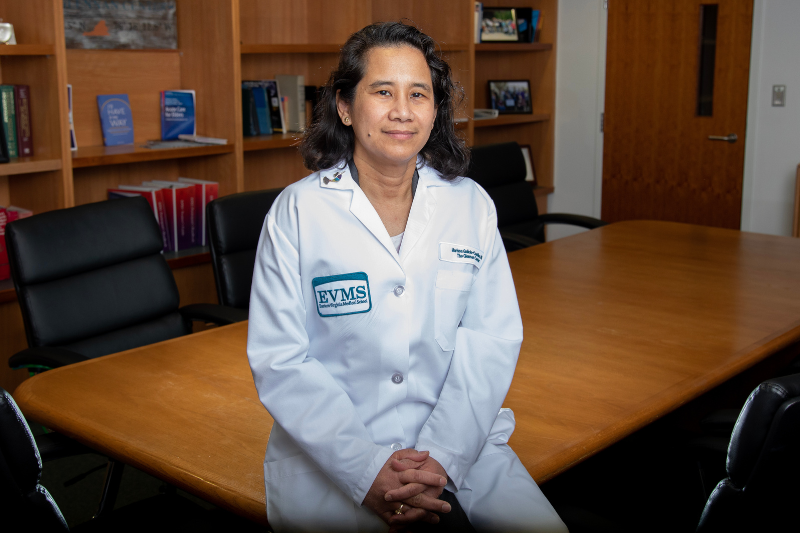EVMS physician discusses palliative care in recent podcast

Hosts of the “We Grieve Differently” podcast, Carolyn K. Williams and Dawn Allen, sat down with Marissa Galicia-Castillo, MD, MSEd (MD'97, Internal Medicine Residency '00), on June 20 to answer one question: Does palliative care mean end of life?
The answer is no, says Dr. Galicia-Castillo, the John Franklin Distinguished Chair for Geriatrics and Director of the Glennan Center for Geriatrics and Gerontology at EVMS. Dr. Galicia-Castillo also serves as Medical Director for the Sentara Norfolk General and CarePlex Palliative Medicine Team and the Lake Taylor Palliative Care Medicine Team.
“Palliative care medicine is a subspecialty of medicine,” she explains in the podcast. “It’s fairly new, and the focus is on people who have serious illness… It doesn’t matter what the age or the stage of whatever the illness is, and the focus is really on quality of life, [which is] defined by everyone differently. So whatever you feel quality of life is for you, the job of a palliative care medicine specialist is to focus treatments to get you toward that quality of life.”
As part of that, she says, palliative care focuses keenly on symptom management, or pain management, to keep patients comfortable throughout their illness — while also receiving treatment intended to cure their illness.
Conversely, hospice care focuses on care and comfort at the end of a patient’s life, at the point when it may no longer be possible to cure serious illness.
“Hospice is an option when two physicians would not be surprised if death occurred in the next six months,” says Dr. Galicia-Castillo.
She’s referring to the Medicare guidelines that outline a patient’s ability to receive insurance coverage for hospice based on the expected outcome.
Does insurance also cover palliative care? Yes, says Dr. Galicia-Castillo, but it can be difficult to find a palliative care provider, so patients should start with their primary care physician.
“Primary care physicians have a good working knowledge of palliative care premises and competencies that would be covered by health insurance. There is a shortage of palliative care physicians — it’s a huge shortage — and so one of our jobs is to train other people to be able to have some of these conversations.”
The interview also outlined tips to prepare for serious illness. These include bringing a friend or family member to appointments to help interpret information, writing down questions ahead of time, and most importantly, having an Advance Care Plan (ACP) in place.
“We’re going to hope for best,” says Dr. Galicia-Castillo. “We’re going to hope that treatment works out. Absolutely. But we’re also going to be prepared, just in case, because we don’t want to be thinking when you’re at high emotion. We want to have at least some kind of game plan.”
Dr. Galicia-Castillo says the most rewarding aspect of palliative care is the people.
“Being able to help guide someone through a really tough time,” she says. “People are very vulnerable.”
Listen to the full podcast on Spotify.
Learn more about the Glennan Center for Geriatrics and Gerontology and hospice and palliative medicine at EVMS.